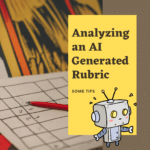Is AI the end of English class?’ looms large as tasks like analyzing a book’s main character can now be addressed by ChatGPT and other generative AI tools. This technological shift naturally evokes a mix of apprehension and excitement within the English Language Arts (ELA) community. English teacher Barton Keeler, however, offers a counterpoint to the fear that AI will replace the essence of English class. Let’s explore his perspective.
As part of my series of workshops with OTIS English teacher Barton Keeler will join me to discuss AI for English Teachers.
Is ChatGPT and Generative AI the end of English class? In this compelling session, Alice and Barton Keeler address a pressing concern in contemporary education: the impact of ChatGPT and generative AI on English classes.
With the rise of AI, many educators worry about increased cheating and the loss of traditional learning methods. This workshop aims to shift the perspective from concern to opportunity, exploring how teachers can adapt and thrive in this new landscape. Alice and Barton Keeler will guide participants through effective strategies to embrace AI in the English classroom that enhance overall learning and enrich teaching rather than replace it. The session will focus on creative solutions to engage students, encourage original thinking, and foster a deeper understanding of language and literature in the age of AI. Attendees will leave with a renewed perspective on the role of English education and practical tools to leverage AI for the benefit of their students.
For Teachers (Not Students, this time)
The potential for ChatGPT and other generative AI tools to become standard resources for students is incredibly exciting. While not yet widespread, this shift could revolutionize how students learn, research, and express their ideas.
This time, we are focusing on how teachers can leverage their use of ChatGPT.
Teaching English in an Age of Generative AI
Imagine a new tool that can help you with those repetitive essay prompts, like analyzing a character in a book. Generative AI, like ChatGPT, is a type of computer program that can learn from tons of writing examples and use that knowledge to create new text. It’s like having a super student assistant who can brainstorm ideas, help with outlining, or even get you started with a draft based on what you tell it. It won’t replace your teaching expertise, but it could be a handy aid for students who struggle with getting started or want to explore different writing styles.
Gen AI Wrote That
I, Alice Keeler, asked Google Gemini to help me write a paragraph to explain what generative AI is.
Write a paragraph explaining to an English teacher who has no clue about generative AI and is generally not tech savy “what is Generative AI”
In plain language, I can ask the generative AI model to answer a question or perform a written task. In some cases, the Gen AI model can create a picture or video!
Teaching English is Challenging
I sometimes joke that teaching English is the worst job ever. Obviously, it’s not, but my English teacher friends always seem buried under far more work than I do as a math teacher. It’s not just the essays – they get roped into all sorts of extra writing-related tasks for the school that other departments never see. Don’t get me wrong, I work hard too, but I’m so happy I don’t have to grade a mountain of essays.
First and foremost, it’s crucial to approach this new era not with fear, but with openness to change. The arrival of AI in the classroom doesn’t signal the end of English education; rather, it marks the evolution of how we teach and how students learn. Remember, the introduction of calculators to math classes didn’t eliminate the need to understand mathematical concepts; it simply shifted the focus towards higher-order thinking skills. Similarly, AI can enhance English education by providing tools that foster a deeper understanding of language, creativity, and critical thinking.
ChatGPT Is Here to Stay
Generative AI models like ChatGPT and Google Gemini offer a range of perspectives. One thing’s for sure: these tools are here to stay. From emails and business letters to proposals and marketing materials, AI’s influence on our writing will only grow. In fact, while writing this very blog post, I repeatedly turned to Google Gemini for help refining my paragraphs.
The Essence of ELA Education
Cultivating empathy, understanding human experiences, fostering creativity, and encouraging critical thought—remains unchanged. AI does not diminish the value of these skills; instead, it provides new avenues for exploration and expression. Let’s embrace AI as a tool that can both take tasks off our plates and enrich the learning experience.
As we navigate this new landscape, let us view AI not as a threat but as an opportunity to streamline tedious tasks, gain new perspectives, and empower our students. By embracing these technologies with a student-centered approach, we can ensure that the heart of English education beats stronger than ever in the age of AI.
In conclusion, the end of English class is not upon us; rather, we are at the beginning of an exciting new chapter. Together, with openness and a commitment to our students’ growth, we can shape an educational future that leverages AI to enhance learning, creativity, critical thinking, and efficiency. Let’s embark on this journey with optimism, embracing the tools that can make our teaching even more impactful.
Take Things OFF My Plate
Learning how to leverage ChatGPT/generative AI can feel like yet another brick on our plates. To prevent that, one of the first things we look at using ChatGPT for is to REDUCE the amount of work we have. Here are a few ways AI can take tasks off our to-do lists:
- Grading Short Responses: Have ChatGPT provide initial feedback on short answer responses or practice exercises. This gives students immediate guidance, while allowing you to focus on more in-depth analysis of complex work.
- Lesson Plan Support: Generate discussion questions, find supplemental reading materials related to a topic, or get quick summaries of complex texts to aid your planning.
- Differentiation: Create variations on worksheets at different reading levels, or get ideas for alternative ways to present a concept.
- Administrative Tasks: Draft routine emails to parents, create quick rubrics, or generate vocabulary lists based on a thematic text.
Important Note: This isn’t about replacing the teacher’s role! It’s about using AI to lighten your load on the more routine aspects of teaching, freeing you to focus on the irreplaceable elements: human connection, targeted support, and inspiring a love of literature and language.
Innovate What is Possible with ChatGPT
Using ChatGPT to streamline our current tasks is a smart move. But, this powerful technology offers so much more – it can help us finally do the things we’ve always wanted in the classroom. While technology moves at lightning speed, adapting our teaching methods, even in ELA, can feel challenging. Let’s embrace the possibilities!
Join Us to Look at ChatGPT for English Teachers
Let’s look into how, as ELA teachers, we can leverage using ChatGPT and generative AI. Create a free OTIS account to join this and other great workshops.
Registration invites you to join in the presentation live, however it also provides you access to the recording afterwards.













1 thought on “Is AI The End of English Class?”